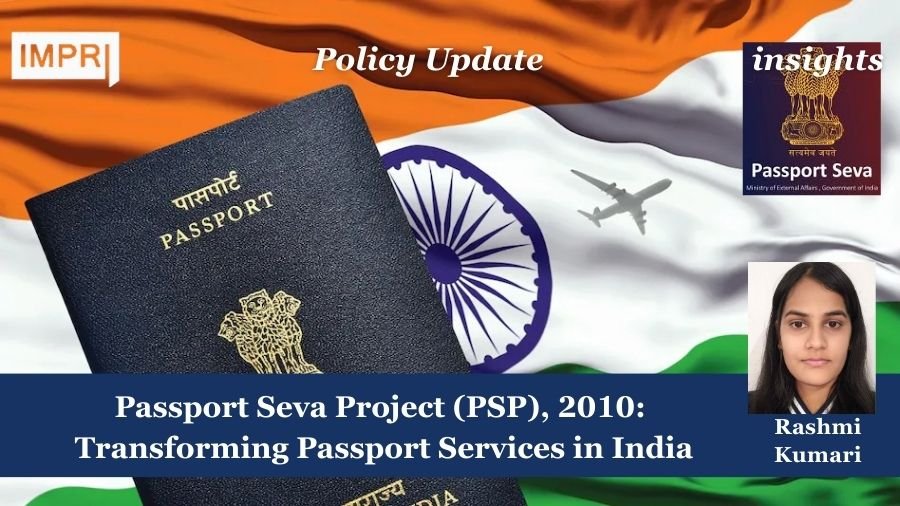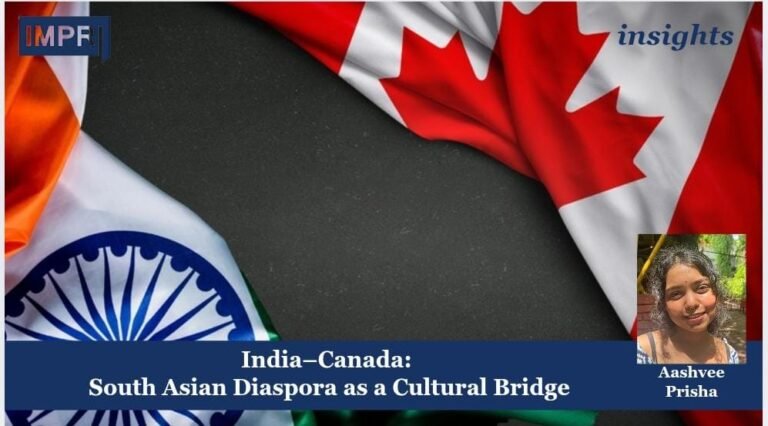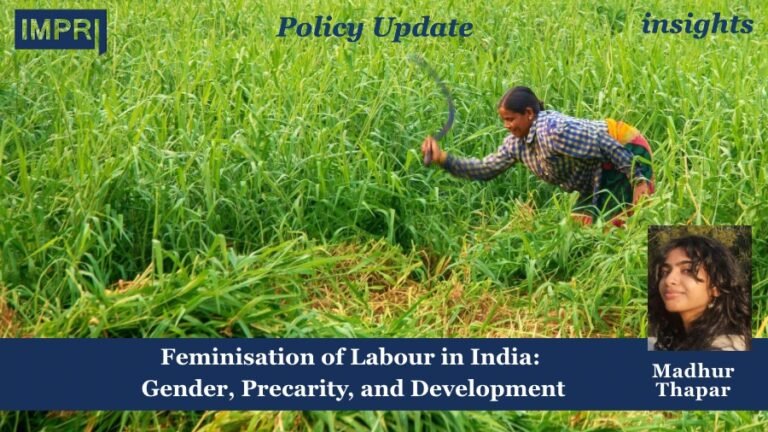Policy Update
Rashmi Kumari
Introduction
A passport is an essential document for travel abroad, and demand for new and renewed passports in India has skyrocketed with the country’s economic growth and global connections. This demand now comes from not just major cities but also smaller towns, creating the need for wider and faster access to passport services.
To enhance and speed up passport services available to citizens, the Ministry of External Affairs (MEA) initiated the Passport Seva Project (PSP) in May 2010. The PSP is a project that is reliant upon a Public-Private Partnership (PPP) with Tata Consultancy Services (TCS), awarded through an open competitive bidding process.
Under this arrangement, all government responsibilities and liabilities, including verification of particulars, acceptance of applications, and issuance of passports, remain controlled by the MEA. The MEA owns all types of major assets, controls the key data and dispositions, and all files are submitted before issuing any passport in the system. The Ministry of External Affairs (MEA) is responsible for the issuance of Passports to Indian Citizens through a network of 37 Passport offices across the Country and 190 Indian Missions and Posts abroad.
Vision
To deliver all Passport-related services to the citizens with process transparency, accountability, timeliness, accessibility and reliability in a comfortable environment by a dynamic and motivated workforce and through a digitally overhauled, agile ecosystem.
Functioning
- Objectives and Launch- Approved by the Union Cabinet in September 2007, PSP aimed to outsource front-end services, establish Passport Seva Kendras (PSKs), create a centralised IT network, and allow the private partner to levy service charges.
Following pilots in Bengaluru and Chandigarh, the project officially went live in June 2012. - Delivery Model
Front-end services, including scheduling appointments, document submission, and biometric data collection, are managed by TCS.
Back-end processes like police verification and passport issuance remain under MEA’s authority.
A centralised IT infrastructure connects PSKs, Regional Passport Offices (RPOs), police, and India Post. - Service Network- Initially, PSP set up dozens of PSKs across India. Over time, this expanded to 93 Passport Seva Kendras and over 430 Post Office Passport Seva Kendras (POPSKs) to improve rural access.
- Mobile & Online Expansion- MEA launched the mPassport Seva mobile app, providing features like appointment scheduling, status tracking, and locating nearby PSKs.
Image Source: https://play.google.com/store/apps/details?id=gov.mea.pspv2&hl=en_IN
Services Offered
Performance
The Passport Seva Project now processes more than 15 million applications every year. This means that Passport Seva Kendras (PSK) process an average of almost 65,000 passports every day. The network now includes 93 PSKs and more than 430 Post Office Passport Seva Kendras (POPSK), and it has reached even tier-2 cities as well as security areas, minimising inconveniences for citizens.
Passport Seva 2.0 commenced on 25th June 2025 and began issuing chip-enabled e-passports, with RFID biometric storage. It re-launched in 13 cities, including Nagpur, Bhubaneswar, Delhi, and Chennai, and will reach all cities across India.
The mPassport Police App has also been instrumental in speeding verification. The mPassport Police App has cut the verification processing, to be delivered in five to seven days in most parts of the country, which in turn has helped the citizens deliver the passport much quicker.
Impact & Achievements
- Efficiency & Transparency – Citizens can now benefit from defined service standards, faster processing, tracking of application status online, and grievance redressal.
- Scalable Infrastructure – The PPP model allowed the scalable delivery of services across urban and rural India via PSKs and POPSKs.
- Technological innovation– E-passports offer better security and global interoperability. The mPassport Police App improved and accelerated verification of police clearance and service delivery, reducing turnaround time.
- Service quality – PSP is recognised with e-governance awards for delivering streamlined, accessible passport services
- Examples of recent local innovations– Patna PSK integrated the use of local traditional folk-art displays in the applicant’s reception area.
Pune RPO’s citizen-centric innovations resulted in recognition and an award, including the installation of an 80 kW rooftop solar plant, saving ₹1 lakh in monthly energy charges and reducing environmental impact in January 2025.
The new Pune Mobile Passport Van at Maharashtra University campus and 12 districts serves the Passport Adalats, providing passport and student services.
Challenges
- Initial Delays & Backlogs – An audit by the CAG of PSP (2012-15) revealed significant delays in appointment scheduling, police verification and dispatch well beyond the expected time limits (the average time taken to issue a passport was 71 days versus the 24-day target).
- Governance and Contractual Issues – Weak governance arrangements, inconsistent Service Level Agreements (SLAs) and a lack of monitoring were contributing to performance issues.
- Rural Access and Digital Divide – Although POPSKs exist, even in cases where POPSK services were available, citizens in hard-to-reach locations were sometimes unable to access services because of infrastructure challenges.
- Misinformation – Misinformation has been generated from misleading statements that regular passports are not valid, as e-passports are being issued. The Pune RPO had to inform the public that a valid existing passport is still valid.
Way Forward
- Finalise e-Passport Roll-Out – Fast-track the rollout of e-passport issuance to all PSKs and POPSKs – and maintain the same rollout across each state in the country.
- Expand Mobile & Hybrid Services – Scale mobile vans and initiatives such as cultural integration to improve outreach and local engagement, particularly in rural or low-access areas.
- Enhance Governance – Regularly monitor SLAs; increase oversight; and deploy real-time dashboards to review service delivery and contractor performance.
- Maximise Police Verification – Continue to deploy the mPassport Police App to all states and continue to track turnaround metrics into the future, to remain agile and accountable.
- Debunk Misinformation – Launch awareness and digital information campaigns to debunk substantially quicker service claims and misinformation, which will improve citizens’ awareness of service improvements.
- Sustainable Practices & User Experience – Continue to investigate sustainability practices (like Pune’s solar initiative), which we can harness across the 77 PSKs. Focus on orienting the service user experience with intended users to enhance design usability, and continue to create a seamless digital user experience, integrating user experiences with local culture to enrich the service experience.
Conclusion
The Passport Seva Project has changed the landscape of passport services in India through innovative applications of technology, decentralisation and developing public-private partnerships. The introduction of e-passports, mobile applications, and outreach services is improving efficiency and expanding access, especially in rural areas. If we stay mindful of our commitments to governance, technology, and awareness, it will remain a global model for digital public services.
References:-
- Ministry of External Affairs (India). (n.d.). Passport Seva Programme (PSP) Division. Retrieved August 2025, from https://www.passportindia.gov.in/psp/pspDivision
- Tata Consultancy Services (TCS). (n.d.). TCS transforms passport services for Indians across the globe [Case study]. Retrieved August 2025, from https://www.tcs.com/what-we-do/industries/public-services/case-study/e-governance-passport-transform-indian-passport-office
- Comptroller and Auditor General of India. (n.d.). Audit report: Passport Seva Project (PSP). Retrieved August 2025, from https://cag.gov.in/en/audit-report/details/21358
About the contributor: Rashmi Kumari is a Research Intern at IMPRI and a Master’s student in Economics at Gokhale Institute of Politics and Economics, Pune.
Acknowledgement: The author extends her sincere gratitude to the IMPRI team and Ms. Aasthaba Jadeja for her invaluable guidance throughout the process.
Disclaimer: All views expressed in the article belong solely to the author and not necessarily to the organisation.
Read More at IMPRI
Gender, Caste and Labour: An Overview of the Sumangali System
Mentoring for Excellence: Impact of the Margdarshan Initiative




